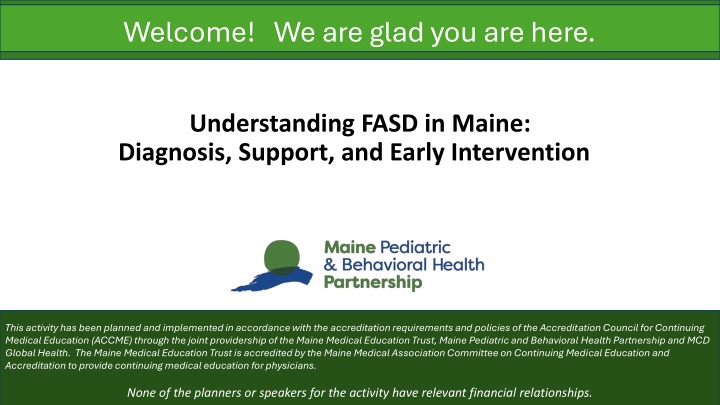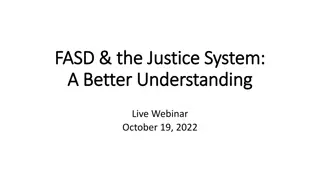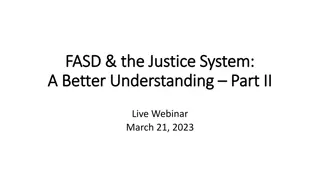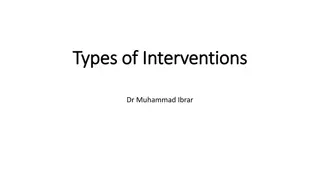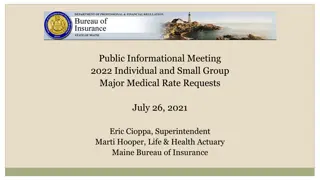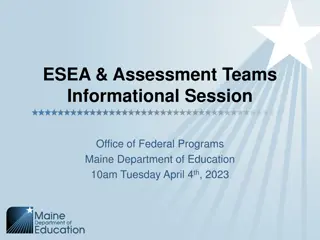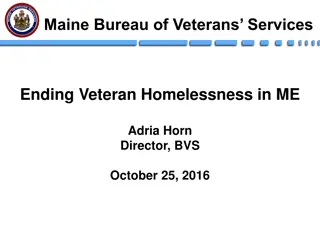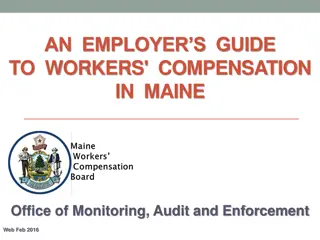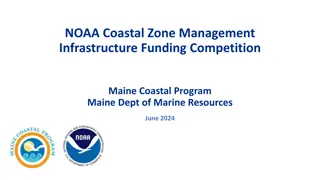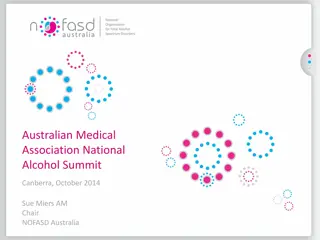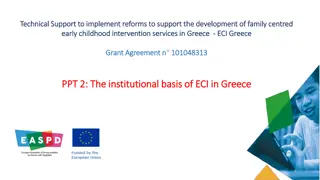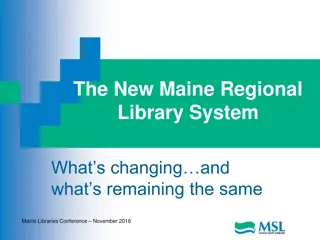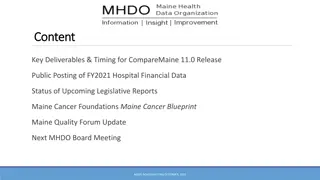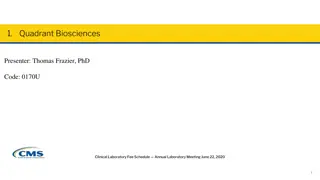Maine FASD: Diagnosis, Support, and Early Intervention
This activity in Maine focuses on specific Fetal Alcohol Spectrum Disorder (FASD) statistics, diagnosis, support, and early intervention for infants exposed to alcohol prenatally. Experts in the field share valuable insights on empowering collaborative research, caregiver involvement, and achieving important developmental milestones in children from birth to three years.
Download Presentation

Please find below an Image/Link to download the presentation.
The content on the website is provided AS IS for your information and personal use only. It may not be sold, licensed, or shared on other websites without obtaining consent from the author.If you encounter any issues during the download, it is possible that the publisher has removed the file from their server.
You are allowed to download the files provided on this website for personal or commercial use, subject to the condition that they are used lawfully. All files are the property of their respective owners.
The content on the website is provided AS IS for your information and personal use only. It may not be sold, licensed, or shared on other websites without obtaining consent from the author.
E N D
Presentation Transcript
Welcome! We are glad you are here. Understanding FASD in Maine: Diagnosis, Support, and Early Intervention This activity has been planned and implemented in accordance with the accreditation requirements and policies of the Accreditation Council for Continuing Medical Education (ACCME) through the joint providership of the Maine Medical Education Trust, Maine Pediatric and Behavioral Health Partnership and MCD Global Health. The Maine Medical Education Trust is accredited by the Maine Medical Association Committee on Continuing Medical Education and Accreditation to provide continuing medical education for physicians. None of the planners or speakers for the activity have relevant financial relationships.
AGENDA 1. Maine Specific FASD Statistics Madonna Mooney, B.S. Ed Co-founder FASDMaine.org 2. Diagnosis and Support Lynn Cole, MSN, CPNP-PC Director of Clinical Services Division of Developmental and Behavioral Pediatrics at the University of Rochester Medical Center 3. Early Intervention Dara Fruchter Strategic Initiatives and Special Projects Manager Early Intervention for ME, Birth to Three, (Part C) 4. Q&A
Early Intervention for ME, Birth to Three Partnering with You to Best Support the Early Development of Maine s Young Children with their Families Dara Fruchter, MS, Strategic Initiatives and Special Projects Manager, Early Intervention for ME dara.fruchter@maine.gov Early Intervention for ME, Birth to Three, Child Development Services (CDS), Maine Department of Education 3
We were named: Child Development Services, (CDS) Part C Maine Department of Education We are now named: 4
Early Intervention for ME, Birth to Three Early Intervention for ME helps children from birth to three achieve important developmental and learning milestones. Empowering Collaborative Research clearly shows; children from birth to three respond best to caregivers they know and trust. Proven In a family and caregiver focused partnership, our early Intervention providers show caregivers how to incorporate learning opportunities and routines into a child s everyday activities, in an environment familiar to the child. Safe 5
Early Intervention and Infants Exposed to Alcohol Prenatally Early intervention for ME provides important developmental support for infants exposed to alcohol in utero starting right after birth or anytime up until a child s third birthday, a very critical period for brain growth. Improved developmental outcomes Identifying early developmental challenges and engaging with a developmental provider and other specialists in an environment familiar for a child as soon as possible can impact a child's potential life-long. An early intervention support process is a partnership between our early intervention providers and an infant s caregivers, and might focus on feeding, sensory processing, and relational experiences. Our services are individualized to meet the needs of each infant and surrounding caregivers. Building Partnerships; Early Intervention and Families Together with parents and other caregivers we celebrate a young child s strengths, identify developmental challenges and create a nurturing early learning environment. As an infant grows and becomes a toddler, we continue serving a young child s individual developmental needs at an individualized pace, offering therapies like speech, physical, and occupational therapy if needed; a variety of individualized developmental strategies can help lessen the potential for cognitive, behavioral, and physical challenges associated with prenatal alcohol exposure and/or a diagnosed Fetal Alcohol Spectrum Disorder (FASD). When an infant experiences prenatal alcohol exposure, early intervention is most effective when started as soon as possible after birth. Individualized Approach, Ongoing Support Each child with prenatal alcohol exposure has unique needs supported by an individualized plan which evolves as the child grows and family needs change. https://www.cdc.gov/fasd/treatment/index.html#:~:text=Early%20intervention%20services%20help%20children,services%20if%20your%20child%20qualifies. https://www.casey.org/prenatal-substance-exposure-interventions/ https://depts.washington.edu/fasdpn/pdfs/chapter%204%20Early%20Interventions%20for%20Children.pdf 6
When to Make A Referral to Early Intervention for ME A referral for a child,birth to three, should be made to Early Intervention for ME when: There is a concern about an infant/toddler s development based on: Parental observation and/or feedback from the family, other caregivers, friends, community partners, and/or informed clinical opinion from medical and social services providers based on relational and observational experiences they ve had with the child An infant or toddler has a diagnosis, condition, exposure, or event noted in their records by a medical professional which is also found on Maine s Established Conditions of Risk List 2024 Results of a developmental assessment or screening show delayed developmental milestones and/or gaps in and learning 7
Maines Established Conditions of Risk List 2024 When an infant or toddler has a diagnosis, condition, exposure, or event, noted in their medical records which is also found on Maine s Established Conditions of Risk List 2024, they are automatically eligible, along with their primary caregivers, for Early Intervention for ME support. Above is a snapshot of Established Conditions of Risk on the List related to this webinar; Maine s most current Established Conditions of Risk List will be shared with all Webinar attendees. 8
How We Provide Programming and Services Early Intervention for ME programming is designed to be a partnership within an individualized framework, free and voluntary, for all Maine families. After being determined eligible, families identify what they would like support with and how often they would like visits to occur. One lead early intervention provider, supported by a team of other professionals, works with the family to help them help the child. We also connect families with additional outside resources and services as needed our focus always supporting the individualized needs of the child, family and other caregivers. 9
How to Make a Referral to Early Intervention for ME Referrals and self-referrals to Early Intervention for ME in support of the developmental health of young children, birth-36 months, may be made by medical, clinical, and social services providers; childcare specialists; and parents, family members, friends, kinship, foster families, and other caregivers. Call the Central Referral Line: 1-877-770-8883 To make a referral, please call us at 877-770-8883 or visit earlyinterventionforme.org REACH: Site serves Cumberland County and select towns in Sagadahoc and Androscoggin counties. 1011 Forest Avenue Portland, ME 04103; 207-781-8855 Online Referrals for Early Intervention for ME Currently Submitted Under Child Development Services Umbrella: https://www.maine.gov/doe/cds/childfindform AROOSTOOK: Site serves Aroostook County and select towns in Washington and Penobscot counties. 985 Skyway Street Presque Isle, ME 04769; 207-746-4490 DOWNEAST: Site serves Hancock and Washington counties. 116 O Brien Avenue, Sennett Hall, Machias, ME 04654; 207-255-4892 Regional Site Contact Information Currently Found Under Child Development Services Umbrella: https://www.maine.gov/doe/learning/cds/contact FIRST STEP: Site serves select towns in Androscoggin, Kennebec, Lincoln, and Sagadahoc counties. 5 Gendron Drive, Suite 1 Lewiston, ME 04240; 207-795-4022 MIDCOAST: Site serves Knox and Lincoln counties and select towns in Sagadahoc and Kennebec counties. 91 Camden Street, Suite 108 Rockland, ME 04841; 207-594-5933 OPPORTUNITIES: Oxford and Rumford sites serve Oxford County along with select towns in Androscoggin, Cumberland, and Franklin counties. 16 Madison Avenue Oxford, ME 04270; 207-743-9701 AND 60 Lowell Street Rumford, ME 04276; 207-369-0132 PEDS: Site serves select towns in Kennebec, Somerset, Franklin, Androscoggin, and Waldo counties. 325 E. Kennedy Memorial Drive Waterville, ME 04901; 207-877-2498 https://www.facebook.com/childdevelopment services/ TWO RIVERS: Site serves Penobscot, Piscataquis, Hancock, and Somerset counties and select towns in Waldo and Aroostook counties. 250 State Street Brewer, ME 04901; 207-947-8493 YORK: Site serves York County and select towns in Oxford and Cumberland counties. 39 Limerick Street Arundel, ME 04046 207-985-7861 10
Early Intervention for ME, Birth to Three and the Individuals with Disabilities Education Act (IDEA) The Individuals with Disabilities Education Act is federal law that ensures students with a disability are provided with a specialized education that is tailored to their individual needs. United States Department of Education Federal Law Amended in 1990 Maine s Early Intervention for ME, Birth to Three program, under the supervision of Maine s Department of Education, is the lead agency responsible for upholding the Part C section of the Individuals with Disabilities Education Act (IDEA) and for providing services statewide. The IDEA(Part C) defines the requirements each state has for an early intervention system which provides birth to three developmental and learning supports for infants, toddlers and their families when there is the potential for developmental challenges or assessed developmental challenges. 11
Thank you for your time! Please contact me anytime for additional information and support. Dara Fruchter, MS Strategic Initiatives and Special Projects Manager dara.fruchter@maine.gov Early Intervention for ME, Birth to Three Partnering with You to Best Support the Early Development of Maine s Young Children with their Families Early Intervention for ME, Birth to Three, Child Development Services (CDS), Maine Department of Education 12
Please submit Data Survey for CME/CEUs Thank you for attending the Webinar and completing the Data Survey! Save the Date Next Webinar: January 23, 2024 @ 7:30-8:30AM
1 1st st Wednesday @ Noon Wednesday @ Noon Case- -Based Learning Collaborative Based Learning Collaborative Case December 4 December 4th Cultural Considerations th ECHO ECHO Dr. Amy Mayhew, MD, MPH Medical Director See You There! Maine Medical Center Division of Child & Adolescent Psychology
